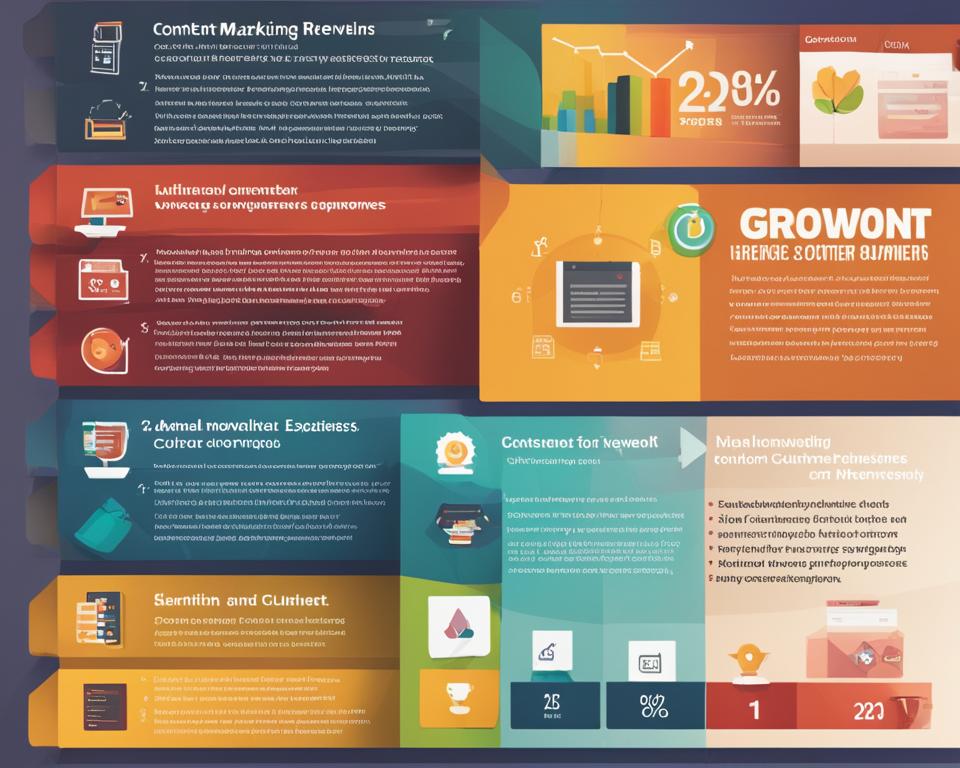As we navigate the ever-evolving landscape of digital marketing, it is essential to keep pace with the latest trends and strategies. In Indonesia’s online market, where competition is fierce, staying ahead requires a deep understanding of key elements such as digital marketing, online marketing, internet advertising, social media marketing, search engine optimization, content marketing, email marketing, pay-per-click advertising, website analytics, and digital marketing strategies.
By harnessing the power of digital marketing, businesses can effectively reach their target audience, strengthen their online presence, and drive conversions. It encompasses various aspects, from engaging in internet advertising and social media marketing to optimizing websites through search engine optimization and creating valuable content through content marketing.
Moreover, email marketing and pay-per-click advertising are essential tactics in a comprehensive digital marketing strategy. These methods allow businesses to connect directly with their target audience and generate immediate results. Through website analytics, it becomes possible to measure the effectiveness of digital marketing efforts and make data-driven decisions.
In the upcoming sections, we will explore each of these elements in detail, providing insights and tips on how to leverage them effectively. By applying the latest digital marketing strategies, you can position your business for success in Indonesia’s dynamic online market.
The Importance and Impact of Digital Marketing
In today’s digital landscape, Digital Marketing has become an integral part of every business strategy. Its significance cannot be understated. Digital Marketing encompasses various online marketing techniques and channels, such as internet advertising, social media marketing, search engine optimization, and more. It has revolutionized traditional marketing methods and transformed the way businesses interact with their target audience.
Through Digital Marketing, businesses can effectively reach their target audience, establish a strong online presence, and drive engagement. By utilizing digital marketing strategies, businesses can leverage the power of the internet to promote their products and services, generate leads, and ultimately maximize their profitability.
One of the key advantages of Digital Marketing is its ability to provide measurable outcomes. Unlike traditional marketing methods, digital marketing allows businesses to track and analyze their marketing efforts in real-time. With the help of website analytics, businesses can gain valuable insights into their audience’s behavior, preferences, and purchase patterns, enabling them to make data-driven decisions and optimize their marketing campaigns for better results.
The impact of Digital Marketing goes beyond increasing brand visibility and generating leads. It also enables businesses to engage with their audience on a deeper level. Through social media platforms, businesses can establish direct communication channels with their customers, build brand loyalty, and foster long-term relationships. Personalized and targeted email marketing campaigns allow businesses to deliver tailored content to their audience, strengthening their connection and driving conversions.
Boost your business with Digital Marketing Strategies
Implementing effective digital marketing strategies is crucial for businesses of all sizes. Whether you are a small startup or an established corporation, digital marketing can help you achieve your marketing objectives and stay ahead of the competition.
“Digital Marketing is not just an option anymore; it’s a necessity. To thrive in today’s digital age, businesses need to embrace digital marketing strategies and leverage the power of the internet to reach their target audience.”
When creating your digital marketing strategy, it is essential to define your target audience, set clear goals, and choose the right channels and tactics that align with your business objectives. Whether you focus on content marketing, social media advertising, or search engine optimization, it is important to have a well-rounded approach that encompasses different aspects of digital marketing.
By adopting effective digital marketing strategies, businesses can enhance their brand visibility, attract qualified leads, and drive conversions. It allows businesses to be in front of their target audience, establish authority in their industry, and build long-term customer relationships.
Now, let’s take a closer look at some of the key digital marketing strategies that can help businesses thrive in today’s digital landscape:
Digital Marketing Strategies
| Strategy | Description |
|---|---|
| Content Marketing | Creating and distributing valuable and relevant content to attract and engage the target audience. |
| Social Media Marketing | Utilizing social media platforms to promote products, connect with the audience, and build brand awareness. |
| Search Engine Optimization (SEO) | Optimizing website content and structure to improve organic search engine rankings and drive targeted traffic. |
| Email Marketing | Sending personalized emails to nurture leads, build customer relationships, and drive conversions. |
| Pay-Per-Click (PPC) Advertising | Creating targeted ads that appear on search engines and websites, driving traffic and generating leads. |
| Website Analytics | Tracking, analyzing, and interpreting website data to optimize marketing strategies and improve performance. |
By incorporating these digital marketing strategies into your overall marketing plan, you can effectively connect with your target audience, establish a strong online presence, and achieve your business goals.
Effective Strategies for Social Media Marketing
When it comes to digital marketing strategies, social media marketing plays a crucial role in building brand awareness and driving customer engagement. In this section, we will explore various effective strategies that businesses can implement to make the most out of their social media presence.
Creating engaging content is the foundation of a successful social media marketing campaign. By developing content that resonates with your target audience, you can capture their attention and encourage them to interact with your brand. Whether it’s informative blog posts, eye-catching images, or entertaining videos, high-quality content is key to building a strong online presence.
Building a strong online presence goes beyond just creating content. It involves actively engaging with your audience by responding to queries, comments, and messages in a timely manner. By being responsive, you can show your followers that you value their feedback and are committed to building genuine relationships.
Another effective strategy for social media marketing is leveraging social media platforms to connect with your target audience. Each platform has its unique audience demographic, and understanding these demographics can help you tailor your content and messages accordingly. By being present on the right platforms and delivering content that resonates with your target audience, you can enhance brand awareness and drive customer engagement.
Captivating Quotes from Industry Experts
“Social media marketing is not just about posting content, but about building meaningful connections with your audience.” – Emily Smith, Social Media Strategist
“Engaging content and consistent interaction are the keys to thriving on social media platforms.” – Michael Johnson, Digital Marketing Consultant
In addition to these strategies, utilizing social media analytics can provide invaluable insights into the performance of your social media campaigns. By tracking metrics such as engagement rate, reach, and conversions, you can identify what works best for your audience and make data-driven decisions to improve your social media marketing efforts.
Implementing these effective strategies will help your business enhance brand awareness, foster customer engagement, and stay ahead in today’s competitive digital landscape.

| Benefits of Effective Social Media Marketing Strategies | Examples |
|---|---|
| Increased brand visibility and awareness | Interactive and shareable infographics, viral videos |
| Improved customer engagement and loyalty | Engaging contests, polls, and quizzes |
| Drive website traffic and conversions | Compelling call-to-action posts, personalized landing pages |
| Opportunity to showcase brand personality | Behind-the-scenes footage, employee spotlights |
By incorporating these strategies into your social media marketing efforts, you can create a compelling online presence that resonates with your target audience and drives success for your business.
The Power of Search Engine Optimization (SEO)
In today’s competitive online landscape, search engine optimization (SEO) has become increasingly important for businesses looking to boost their website visibility and drive organic traffic. By implementing effective SEO strategies, you can improve your website’s ranking on search engine results pages, making it easier for potential customers to find you.
At [Brand Name], we understand the power of SEO and its impact on digital marketing strategies. In this section, we will explore various SEO techniques that can help enhance your online presence and attract targeted visitors.
Keyword Research
One of the first steps in SEO is conducting comprehensive keyword research. By identifying relevant keywords and phrases that your target audience is searching for, you can optimize your website content accordingly. Keyword research provides insights into consumer behavior, allowing you to create valuable and tailored content that aligns with their interests and needs.
On-Page Optimization
On-page optimization plays a crucial role in improving your website’s visibility to search engines. This includes optimizing your title tags, meta descriptions, headings, and URL structure. By incorporating targeted keywords into these elements, search engines can better understand the context of your web pages, resulting in higher rankings.
Link Building
Link building is another essential aspect of SEO. By acquiring high-quality backlinks from authoritative websites, search engines view your website as trustworthy and relevant. Implementing effective link-building strategies can help increase your website’s domain authority, thus improving your chances of ranking higher in search results.
Our experienced team at [Brand Name] specializes in crafting customized SEO strategies that cater to your business goals. With a data-driven approach and industry best practices, we can optimize your website to reach its full potential and generate sustainable organic traffic.
Remember, search engine optimization is an ongoing process that requires continuous monitoring and adjustment. By staying up to date with the latest SEO trends and algorithms, you can stay one step ahead of your competitors and maximize your digital marketing efforts.
| Benefits of SEO | Challenges of SEO |
|---|---|
| Improved visibility on search engine results pages | High competition for top rankings |
| Increased organic website traffic | Constant algorithm updates |
| Enhanced brand credibility and authority | Time-consuming and resource-intensive |
| Cost-effective compared to paid advertising | Need for continuous optimization and monitoring |
Harnessing the Benefits of Content Marketing
In today’s digital landscape, content marketing plays a pivotal role in driving success for businesses. By creating valuable and relevant content, businesses can effectively attract, engage, and convert their target audience. Let’s explore how content marketing can contribute to your overall digital marketing strategy and help you achieve your business goals.
The Importance of Valuable and Relevant Content
Content marketing revolves around providing informative, educational, and entertaining content to your audience. By delivering content that meets their needs and interests, you establish your brand as a trusted source of information. Valuable and relevant content helps you build credibility, increase brand awareness, and foster a strong relationship with your audience.
When creating content, consider your target audience’s pain points, challenges, and interests. Tailor your content to address these specific needs and provide actionable solutions. By offering valuable insights, tips, and advice, you position your brand as an industry expert and develop a loyal following.
Distributing Content Through Various Channels
Content marketing involves distributing your content through multiple channels to reach a wider audience. Consider leveraging platforms such as your website, blog, social media, email marketing, and guest posting to amplify your content’s reach.
Remember, each channel requires a tailored approach. Optimize your content for search engines to improve its visibility on your website and blog. Utilize social media platforms to engage with your audience and encourage sharing. Leverage email marketing to nurture leads and build customer relationships. And explore guest posting opportunities on reputable websites to expand your brand’s reach.
By diversifying your content distribution strategy, you can attract new visitors, reach untapped markets, and drive traffic back to your website or landing pages.
Measuring Content Effectiveness
One of the key benefits of content marketing is its measurability. By analyzing relevant data and metrics, you can gauge the effectiveness of your content strategy and optimize your efforts for better results.
Website analytics provide insights into the performance of your content, including page views, time spent on page, bounce rate, and conversion rates. These metrics help you understand which types of content resonate most with your audience, allowing you to refine and improve your content creation process.
Regularly monitor your content’s performance, identify patterns, and make data-driven decisions to enhance your content marketing strategy. Consider using tools like Google Analytics or social media analytics to gain deeper insights into your audience’s engagement with your content.
Remember, content marketing is an ongoing process that requires continuous evaluation and adaptation to stay relevant and impactful.
Fueling Thought Leadership and Driving Conversions
A successful content marketing strategy positions your brand as a thought leader within your industry. By consistently delivering valuable content, you establish yourself as an authority, gaining trust and credibility among your audience. This thought leadership can lead to increased brand recognition, customer loyalty, and business growth.
In addition to building thought leadership, content marketing also drives conversions. The valuable and relevant content you provide educates and informs your audience, guiding them through the buyer’s journey. By delivering content that addresses their pain points and showcases your unique value proposition, you can nurture leads, build trust, and ultimately drive conversions.
Strategically incorporate calls-to-action (CTAs) within your content to prompt your audience to take the desired action, such as signing up for a newsletter, requesting a quote or consultation, or making a purchase. By aligning your content with your business goals, you can maximize the impact of your content marketing efforts.

| Benefits of Content Marketing |
|---|
| Establishes brand credibility and thought leadership |
| Increases brand awareness and visibility |
| Builds strong relationships with your audience |
| Drives website traffic and organic search visibility |
| Nurtures leads and guides them through the buyer’s journey |
| Generates high-quality leads |
| Boosts customer retention and loyalty |
| Enhances brand reputation and trust |
| Increases conversion rates and business revenue |
Driving Results with Email Marketing and Pay-Per-Click Advertising
In today’s digital landscape, email marketing and pay-per-click (PPC) advertising are two powerful tools that can significantly boost your digital marketing efforts. By leveraging these strategies, you can effectively reach your target audience, drive website traffic, and maximize your ROI. Let’s explore the key elements and benefits of these digital marketing strategies.
The Power of Email Marketing
Email marketing has stood the test of time and remains one of the most effective methods for engaging with your customers. It allows you to connect with your audience directly in their inbox, delivering personalized and relevant content. Here are some key elements to consider when implementing an email marketing campaign:
- List Segmentation: Divide your audience into specific segments based on demographics, behaviors, or interests to personalize your campaigns and increase engagement.
- Personalized Content: Tailor your email content to resonate with each recipient, addressing their pain points, offering targeted promotions, and providing valuable information.
- Automated Workflows: Set up automated email workflows to nurture leads, welcome new subscribers, and re-engage inactive customers. This ensures timely and consistent communication with your audience.
Email marketing allows you to build strong relationships with your audience and drive website traffic, leading to increased conversions and revenue.
The Benefits of Pay-Per-Click Advertising
Pay-per-click (PPC) advertising is a highly targeted form of online advertising that enables you to display ads to users who are actively searching for products or services similar to yours. This form of advertising offers several benefits:
- Immediate Results: Unlike other digital marketing strategies that require time to generate results, PPC advertising delivers immediate visibility and clicks to your website.
- Increased Brand Exposure: PPC ads appear at the top of search engine results pages, increasing your brand exposure and positioning you as a trusted authority in your industry.
- Controlled Budget: With PPC advertising, you have full control over your budget. You only pay when a user clicks on your ad, allowing you to set a daily or monthly budget that aligns with your marketing goals.
By utilizing email marketing and PPC advertising, you can drive qualified traffic to your website, generate leads, and ultimately increase your revenue. These strategies play a pivotal role in any comprehensive digital marketing strategy.
Conclusion
In conclusion, staying up to date with the latest trends and strategies in digital marketing is crucial for success in Indonesia’s evolving online market. By harnessing the power of online marketing, businesses can effectively reach their target audience, enhance brand awareness, and drive conversions.
A well-planned digital marketing strategy allows businesses to stay ahead of the competition and achieve their objectives. Whether it’s through social media marketing, search engine optimization (SEO), content marketing, email marketing, or pay-per-click advertising, having a comprehensive strategy ensures that your brand is visible and relevant in the digital landscape.
By utilizing these key digital marketing strategies, businesses can establish a strong online presence, connect with their target audience, and drive meaningful engagement. From creating valuable content that resonates with your audience to optimizing your website for search engines, each strategy plays a vital role in building brand equity and driving sustainable growth.
FAQ
What is digital marketing?
Digital marketing refers to the use of various online channels, such as websites, social media platforms, search engines, and email, to promote products or services and connect with a target audience. It encompasses various strategies, including online advertising, search engine optimization, content marketing, email marketing, and more.
What is online marketing?
Online marketing is a broader term that encompasses digital marketing. It refers to promoting and selling products or services using various online channels, including websites, social media platforms, email, search engines, and more. Online marketing incorporates strategies such as digital advertising, search engine optimization, content marketing, and email marketing.
What is internet advertising?
Internet advertising, also known as online advertising, refers to promoting products or services using online platforms and channels. It includes various ad formats such as display ads, search engine ads, social media ads, video ads, and native advertising. Internet advertising allows businesses to reach their target audience effectively and measure the success of their advertising campaigns.
What is social media marketing?
Social media marketing uses social media platforms like Facebook, Instagram, Twitter, LinkedIn, and others to reach and engage with the target audience. It involves creating and sharing content, running targeted advertising campaigns, and building a strong social media presence to enhance brand awareness, drive customer engagement, and generate leads or sales.
What is search engine optimization (SEO)?
Search engine optimization is the practice of optimizing a website to improve its visibility and ranking in search engine results pages (SERPs). It involves various techniques like keyword research, on-page optimization, technical optimization, and link building. By implementing SEO strategies, businesses can increase organic (non-paid) traffic to their website and attract relevant visitors.
What is content marketing?
Content marketing is a strategic marketing approach that involves creating and distributing valuable, relevant, and consistent content to attract and engage a target audience. It can take various forms, such as blog posts, articles, videos, infographics, podcasts, and more. Content marketing aims to establish thought leadership, build brand credibility, and drive profitable customer action.
What is email marketing?
Email marketing is a digital marketing strategy that involves sending targeted emails to a group of subscribers or customers. It is used to promote products or services, build customer relationships, drive website traffic, and generate leads or sales. Effective email marketing campaigns utilize personalized content, segment the audience, and leverage automation to deliver relevant and timely messages.
What is pay-per-click (PPC) advertising?
Pay-per-click advertising is an online advertising model in which advertisers pay a fee each time their ad is clicked. It commonly refers to search engine advertising, where businesses bid on keywords relevant to their products or services. When a user searches for those keywords, the ads appear at the top of the search results. PPC advertising allows businesses to drive immediate traffic to their website and is highly measurable and cost-effective.
What is website analytics?
Website analytics is the practice of collecting, analyzing, and interpreting data about website visitors and their behavior. Through tools like Google Analytics, businesses can track metrics such as website traffic, user demographics, bounce rate, conversion rate, and more. Analyzing website analytics data provides valuable insights to optimize marketing strategies, improve user experience, and make data-driven decisions.
What are digital marketing strategies?
Digital marketing strategies are well-defined plans or approaches that businesses use to achieve their marketing goals using digital channels and technologies. It includes a combination of various digital marketing tactics, such as social media marketing, search engine optimization, content marketing, email marketing, pay-per-click advertising, and more. Digital marketing strategies are customized to the specific objectives and target audience of each business.





